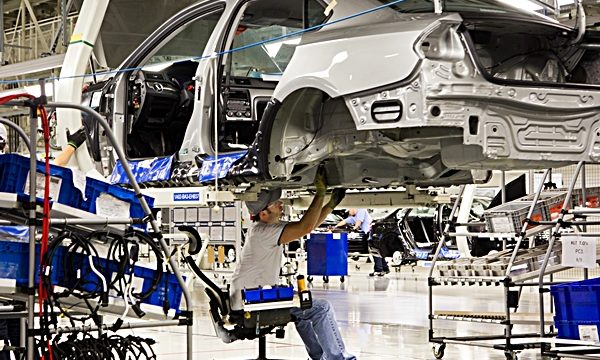UAW’s case in Tennessee wasn’t solid, labor expert says

NO APPEAL: The UAW seems done with an appeal of February’s vote at the VW plant in Chattanooga.
By Chris Butler | Tennessee Watchdog
NASHVILLE, Tenn. — The United Auto Workers had reason to abandon — at least temporarily — its drive to establish itself at Chattanooga’s Volkswagen plant. But, a labor expert said, union officials may never say why the UAW backed out.
There’s more to the story than what union President Bob King has said publicly, according to Patrick Semmens, spokesman for the National Right to Work Foundation.
The foundation defended the interests of five VW employees who opposed the union’s involvement there.
“We learned last week the NLRB rejected the UAW’s appeal to keep our five workers out of this hearing,” Semmens said.
“Our staff attorneys were down in Chattanooga today. They were prepared to present evidence and make the case in these hearings that the results of the election should stand.
“The UAW thought there was a chance they could hold this hearing and only have one side present it. They thought they would be able to cherry-pick the evidence and get the judge to order a re-run election on that basis,” Semmens said.
Semmens said UAW officials panicked once they learned the opposing side could cross-examine pro-union witnesses.
“When they realized that all of that was going to happen I think that’s a very big reason why they said, ‘You know what? We don’t want to go forward,’” Semmens said, despite the fact he previously complained of a pro-union bias among NLRB members under President Obama.
But even the UAW knew it didn’t have a strong enough case for an appeal, he said.
UAW officials Monday did not return Tennessee Watchdog’s request for comment.
The UAW’s decision not to go forward with the hearing certifies the results of a February election in which VW workers voted, 712-626, against union involvement at their Chattanooga plant.
In a news release, King said union officials ended their appeal of February’s election for fear that it would “drag on for months or even years.”
King also blamed Tennessee’s Republican Gov. Bill Haslam and Republican U.S. Sen. Bob Corker for failing to cooperate with subpoenas they received to appear at Monday’s hearing.
In the same release, UAW Region 8 Director Gary Casteel, responsible for the union’s Southern region, had a special request for Haslam.
Casteel said he wants Haslam to offer VW, once again and unconditionally, a $300-million incentives package of taxpayer money so the company may produce a new SUV in Chattanooga.
As Tennessee Watchdog previously reported, UAW officials cited that original offer, which state officials said they withdrew one month before February’s election, as evidence of a bullying campaign against the union.
In an emailed statement, Haslam spokesman David Smith said the governor wouldn’t rule out agreeing to such a package.
“The governor looks forward to sitting down with the company to discuss VW’s growth in Tennessee,” Smith said.
In a separate email, Tennessee Department of Economic and Community Development spokesman Clint Brewer said about the same thing.
UAW officials laid out in the release a few other options they might pursue.
“Looking ahead, the UAW believes the congressional inquiry into the Haslam administration’s incentives threat to Volkswagen provides the best opportunity for additional scrutiny,” King said.
“The UAW will ask Congress to examine the use of federal funds in the state’s incentives threat, in order to protect Tennessee jobs and workers in the future.”
Corker, one of many elected officials who received and ignored a subpoena to appear at Monday’s hearing, said in a release the UAW feared another election, which they would likely lose by an even larger margin.
“This 11th hour reversal by the UAW affirms what we have said all along — that their objection was nothing more than a sideshow to draw attention away from their stinging loss in Chattanooga,” Corker said.
As Tennessee Watchdog previously reported, the UAW may not legally attempt another vote at the plant for at least another year.
Talks between UAW and VW workers had revolved around whether the union could form what has been known as a European-style works council, which no other U.S. automobile factory has. Some say that’s tantamount to having a union.
A union isn’t legally required for the type of activity that goes on in works councils, at least not in the United States, according to the NRWF website.
Tennessee is a right-to-work state, meaning workers can’t be fired for not joining the UAW and paying union dues.
Contact Christopher Butler at chris@tennesseewatchdog.org. or follow him and submit story ideas on his official Facebook page.
Get regular Tennessee Watchdog updates through our Facebook or Twitter accounts
Like Watchdog.org? Click HERE to get breaking news alerts in YOUR state!
Please, feel free to “steal our stuff”! Just remember to credit Watchdog.org. Find out more








